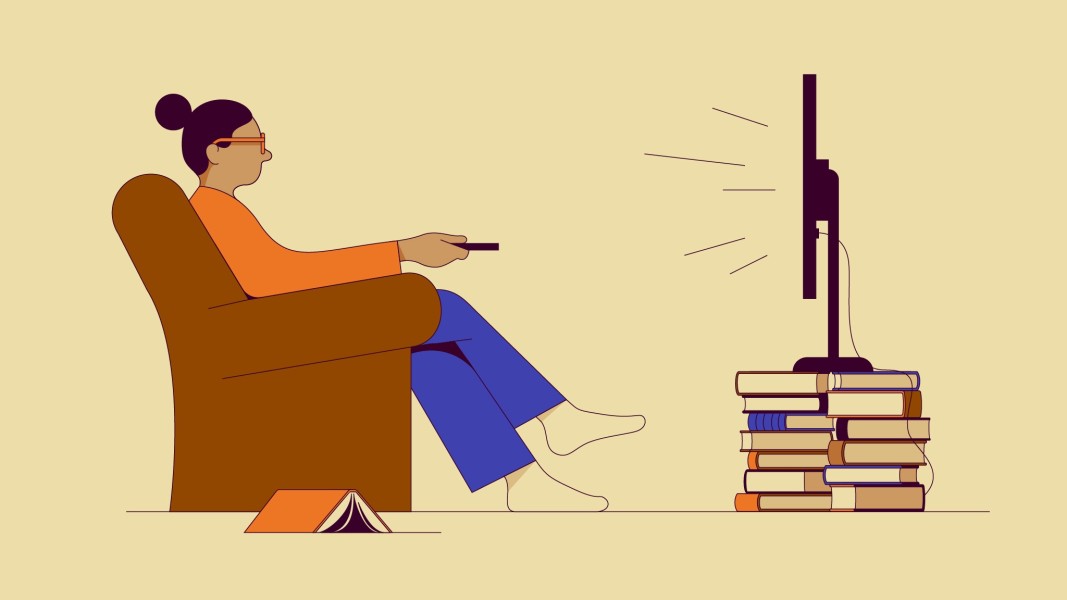
The other day I read a book, Vladimir, by Julia May Jonas. It was intriguing and unsettling, but that’s not the point. Its significance is that I finished a novel, something I have struggled to do, aside from holiday binges and for work, in more than two years.
I’ve had these dry patches before, at home with a newborn or unhinged by grief, the words oozing through my eyeballs and jangling my brain. The fix is usually a ripping thriller (or several) before moving on to something more challenging.
Readers argue over whether to give up on a book you’re not enjoying or to plough through, like eating fibrous vegetables. Without taking a stance, I have permitted myself to stop: my Kindle and bedside table are now memorials to the fallen novel.
It is tempting to blame Twitter. But social media is just the latest tool of distraction rather than something newly rotten. Over centuries, new technology has sparked panic about concentration. In 1665, diarist Samuel Pepys recorded that he could not “forbear carrying my watch in my hand in the coach all this afternoon, and seeing what o’clock it is one hundred times”.
My difficulty stemmed from the pandemic. After absorbing so much information about the new virus, the last thing I wanted to do at night, my usual reading time, was read more words. Instead, I turned to television. Gallup, the opinion poll company, suggests alternative entertainment might be one reason Americans read “a smaller number” of books (under 13) in 2021 than at any time since 1990, when it started the survey. TV became my escape. First, High Maintenance, the anthology series about a weed dealer who breezes in and out of New Yorkers’ homes, a lightness in contrast to the cloying claustrophobia of the times. Later, Party Down, a comedy about out-of-work writers and actors working as wait staff at Hollywood events, a reminder of the joys of casual relationships.
Netflix’s recent adaptation of Jane Austen’s Persuasion has been panned, but some TV series have improved on the books. Dare I mention Sally Rooney’s Normal People, which caused such fandom that even the male lead’s silver chain became a star? Or The Leftovers, a 2014 drama more moving than the Tom Perrotta novel on which it was based? As a meditation on grief and the global reaction to the “sudden departure” of some people, it took on a new resonance with the pandemic’s shifting sands.
Literary fiction encourages “empathy” and “critical thinking”, an article in Harvard Business Review argued. But so does television drama. Barry Jenkins’s adaptation of Colson Whitehead’s Pulitzer-winning The Underground Railroad vividly transported viewers into the brutal world of slavery and slave-catchers, while Succession and Breaking Bad invite critiques of voracious capitalism.
In her book I Like to Watch, Emily Nussbaum, a New Yorker staff writer and former TV critic, observes that in its early days, prestige TV was likened to novels in order to lift the form from its lowly status in a cultural hierarchy that pitched literature as high art and the goggle-box as dumb. TV is marked, she writes, by an episodic rhythm brought to fruition by a team rather than a singular author. But sometimes the literary comparison seems apt. The ending of I May Destroy You, Michaela Coel’s drama about sexual consent, played with structure just as cleverly as an experimental novelist, as the central character (played by Coel), a writer, tries out different narratives.
A study last year found that “among middle-aged adults, greater television viewing in early to mid-adulthood was associated with lower grey matter volume”, even when considering other factors such as exercise. Yet it did not differentiate between shows. Is it fair to lump a shopping channel with the incisive comedy Atlanta? Reddit forums teem with debate about television plotlines and point out cultural references, a sign that many viewers are not passive but highly exercised.
Social media, with its photos of book piles, “shelfies” and hashtags such as #amreading and #booknerd, fetishises reading. I’ve been guilty. I once left a book out I thought might impress a date: a collection of Christopher Hitchens’s essays to flatter his white-collar machismo and prove I was, in the words of the psychotic narrator in Gillian Flynn’s Gone Girl, a “cool girl . . . a hot, brilliant, funny woman who adores football, poker, dirty jokes and burping”.
I am assuaging guilt rather than making a case for a bookless future. It is restful to control the flow of information in a world of breaking news. Elegantly crafted words are a thing of beauty. But most novels are not high art. And sometimes television may prove more serious, delightful or transcendent.
Emma Jacobs is the FT’s Work and Careers features writer. Simon Kuper is away
Follow @FTMag on Twitter to find out about our latest stories first







